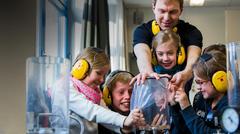Hamburg's school senator Ties Rabe (left) and DESY Director Helmut Dosch test the power of the vacuum in a mini version of the Magdeburg hemispheres. Photo: DESY, Axel Heimken
For 25 years, the name has been the program and the concept is more relevant today than ever before: "grasp" physics, in the sense of "touching", "trying out", but also "understanding", aims to get students interested in science and to reduce reservations and prejudices. DESY's school lab physik.begreifen, the first of its kind in the Helmholtz Association, has now celebrated its round anniversary in a ceremony attended by Hamburg's school senator Ties Rabe and physics entertainer, book author and former DESY scientist Michael Büker. Guest of honor was DESY's former administrative director Helmut Krech, who initiated the school lab.
physik.begreifen is a bridge between teaching and research: The students leave their everyday school life for one day and experiment independently in a research laboratory set up especially for them. The aim is for the students to try things out and work things out for themselves, while the supervising students remain in the background and give the students plenty of space. Mistakes are allowed, there is no time or grade pressure. The range of experiments is broad, from the topic "Vacuum" for 4th to 6th grade, "Magnetism" for 7th and 8th grade and "Radioactivity" for 9th and 10th grade to the topics "Quantum Physics" and "Particles and Fields" for the upper grades. It thus fits the curriculum, but the solution methods and techniques correspond to those of researchers. From the beginning, the lab has been supported by the Hamburg School Board.
Schools Senator Ties Rabe: "As an extracurricular place of learning, the DESY school laboratory has taken up an indispensable place in the curriculum of many Hamburg schools, and the practical courses are taken up by students from grade four to the upper grades. These unique technical facilities are even open to students from all over Germany in the context of vacation seminars and master classes. With 4000 students visiting the lab in 2022, the DESY student lab is well on its way to reaching the pre-pandemic numbers of 7400 students annually, I am very pleased."
"More than ever before, natural sciences shape our everyday lives and are the basis for a bright future," DESY Director Helmut Dosch also says. "As basic researchers, we have a vested interest, but also a moral responsibility, to bring our enthusiasm for natural sciences to society. This is what physik.begreifen has been doing for 25 years with great success. For this, a hearty congratulations!"
For DESY particle physics director Beate Heinemann, the joy of research and discovery is crucial, which physik.begreifen conveys: "The physik.begreifen school lab succeeds very well in arousing the curiosity of the students, and especially in conveying the joy of finding something out through experimental research."
Judith Pirscher, State Secretary at the Federal Ministry of Education and Research, conveyed her congratulations in a message of greeting: "Physics electrifies and literally makes us reach for the stars. This can be felt by anyone who becomes a researcher in DESY's physik.begreifen laboratory for schoolchildren. physik.begreifen promotes young people's interest in the natural sciences. This is important, because we need many more young people in the MINT subjects. The direct connection to a research center makes the experience particularly tangible and practical. The lab offers a great change of pace and new impetus for lessons at school. I would like to thank everyone involved for their important work over the past 25 years and wish them all the best for the future."
More than 110,000 schoolchildren, especially from Hamburg and the surrounding area, have now visited the school research labs at the large-scale research center and have been able to experience how scientific work works. For some, the impression was so formative that they - as physics students - have already become supervisors in the physik.begreifen labs themselves.
At the same time, physik.begreifen was a model for a number of student labs in Hamburg and in the Helmholtz Association, whose research centers now operate more than 30 such extracurricular learning sites. DESY now operates physik.begreifen laboratories at its two sites in Hamburg and Zeuthen and has expanded its program to five subject areas for school grades 4 to 13.








